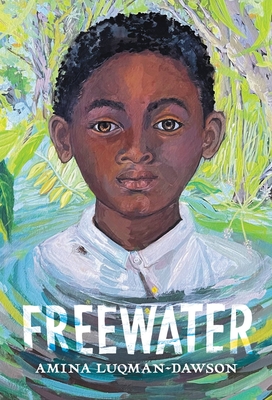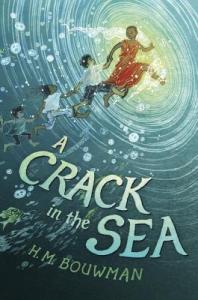by Amina Luqman-Dawson
First sentence: “Sanzi had broken yet another rule, but she didn’t care.”
Support your local independent bookstore: buy it there!
Content: There is violence against human beings – beatings and whippings, talk of removing fingers, and violence in the wild. It is in the Middle Grade section of the bookstore.
Homer is an enslaved boy at a plantation in the south. When we first meet him and his sister, Ada, they are running for their freedom. They’re supposed to be with their mother, but Homer insisted that they go back for his friend, Anna. Which meant that their mother, Rose, was caught. Homer and Ada kept running and found their way into the swamp. From there, they met some formemrly enslaved Black people as well as free Black people in their free community, deep within the swamp: Freewater.
This is less the story of Homer and Ada’s escape – that really only takes a chapter or two – and more of them learning to live free. Homer is obsessed with going back for his mom and works toward being able to do that. Ada is just a 7-year-old getting underfoot. They meet other children: Billy, who is a formerly enslaved person like them, and Sanzi and Juna who were born free in Freewater. Sanzi wants nothing except to be like Suleman – a tracker and explorer. Juna is a homebody and from all accounts, her mother’s “favorite”. We follow them as they experience life in Freewater.
I hate to say it, but I felt like this book was more Important than, well, Good. It is important: these stories of slavery need to be told. While people need to be shown as what they were: often cruel, but sometimes some of them were kind (if misguided). The struggles of Black people need to be told, and their joys and successes – like building a whole community in a swamp! – need to be written down. (The book is based on a real place, which is quite remarkable.)
But I wasn’t engaged. I slogged through until the very end, when it got exciting, as the children (and a couple of adults) raided the plantation wedding (wreaking havoc) during a wedding to rescue Homer’s mother. Luqman-Dawson captured the tension of doing that and made the stakes relatively high.
It was just a chore getting to that point. So, while I see the Importance and Value of this book and am glad it’s out there for people to read, it will not be my favorite.










